I rise again after the surf monster’s slap in Santa Teresa. I realize El Tunco might not be the best fit for me. Guided by local friendliness, I dive deeper into understanding more about El Salvador’s culture and people.
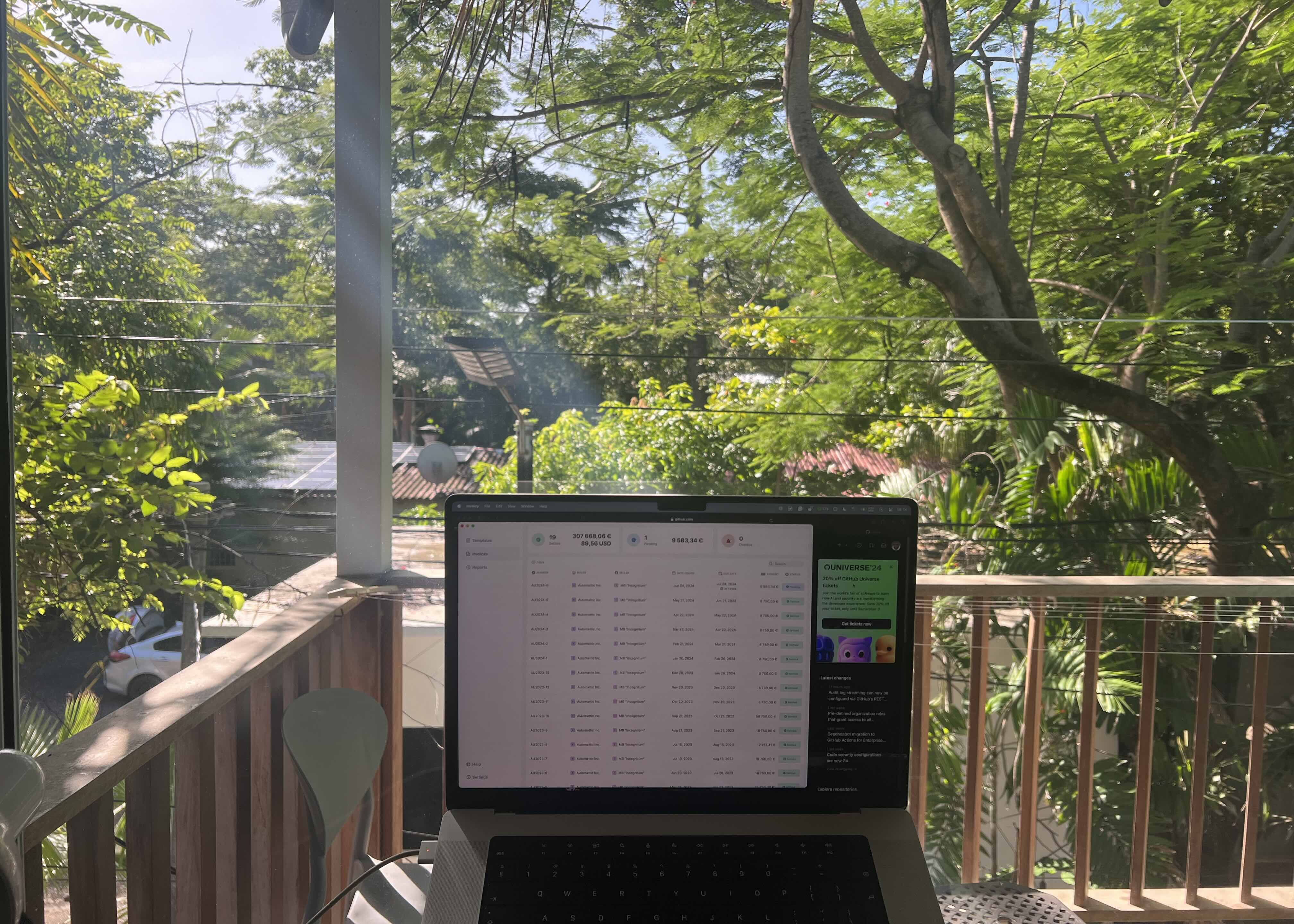
When I landed in El Salvador, I wasn’t exactly sure what to expect. On one hand, I knew that this country once had one of the highest murder rates per capita, but on the other, I was aware that the situation had drastically improved in recent years, making it one of the safest in the Americas by that same measure.
I also knew the country had some controversial things, like Bitcoin being one of the official currencies and a president who’s almost painted as a dictator by outside media. But honestly, I didn’t care much about any of that. I was here to surf, learn about the culture, and create a more informed picture in my head.
Arriving
After landing, I was very surprised to see that immigration queues were almost nonexistent. Maybe I arrived at the perfect time when there were no people, or maybe they just had a lot of staff working, but the end result was that I was very happy and surprised at how quickly I passed through immigration. While my first interaction with the immigration officer was pleasant, what really made me feel welcome was a few officers standing by a table after immigration. One of them asked me if I spoke Spanish, and I gave my unoriginal, probably thousand-times-used answer: “Yes, I speak a bit of Spanish but want to learn more.” She then responded very quickly, and I stood there with wide eyes, embarrassed that I didn’t catch what she said. But the beautiful part was that the officer next to her told her something like, “No, you should try it a bit slower, he is still learning.” After those words, she repeated the question more slowly, and my face lit up. I quickly answered, “No, no tengo nada que declarar” and left them feeling so happy that my comprehensible input hadn’t gone to complete waste.
At this point, I was already in a great mood. I stepped outside, and the sun was shining. Everything looked clean. Almost no “amigo taxi taxi” folks bothering me, or at least they weren’t as pushy as in some other countries. I was tired after the trip and needed to check in soon, so I called an Uber. After my Uber was confirmed, I started walking toward the meeting point when I suddenly heard someone shouting some foreign, improvised version of my name. I was a bit surprised, as I didn’t recall having any friends in El Salvador. A few moments later, everything made sense, it was my Uber driver practicing his Lithuanian skills by trying to pronounce my name.
Once again, my Spanish was put to the test. He explained that we needed to go to the parking lot so he could pay for his parking ticket before we could leave. This time, I felt more confident with my Spanish and handled the situation pretty well. A few moments later, we were in a hot car, ready to head towards El Tunco.
As I mentioned earlier, at this point I was feeling really good. The sun was shining, everyone I interacted with was friendly, and I got to practice my Spanish. The first thing that instantly caught my attention when we started driving was how good the roads were. Maybe for someone coming from a developed country with top-notch infrastructure, it wouldn’t be that remarkable. But for my Latin American eyes, it looked really impressive. Naturally, I had to compliment my driver. Seeing his prideful reaction made me happy. He was thrilled to talk about the roads and how much they’ve improved recently, and soon after, he started pointing out massive buildings that didn’t exist just a year ago. Of course, as we moved further from the airport, we encountered some roads that weren’t in such pristine condition, but with so much construction going on, it seemed inevitable that these old roads would also be revived for an exciting new life.
Apart from pretending to be an old business guy who appreciated talking about construction and road conditions, I also became an old farmer who appreciated the many roadside vendors selling massive watermelons. After chatting about agriculture for a few minutes, I had to ask what my companion’s favorite fruit was. His answer was so surprising that I had to Google it to make sure I heard the Spanish word correctly and wasn’t imagining things. His favorite fruit was manzana, also known as an apple. This shocked me because, back home, apples are one of the most common and, frankly, boring fruits (at least to me). How could someone living in a tropical paradise with so many exotic fruits say their favorite is an apple? Well, the answer was obvious. The sweetest and most precious fruit is the one that doesn’t grow in your yard. After a quick back-and-forth about which country has cheaper apples, I was crowned the winner and spent the rest of the ride thinking about apples.
Situation
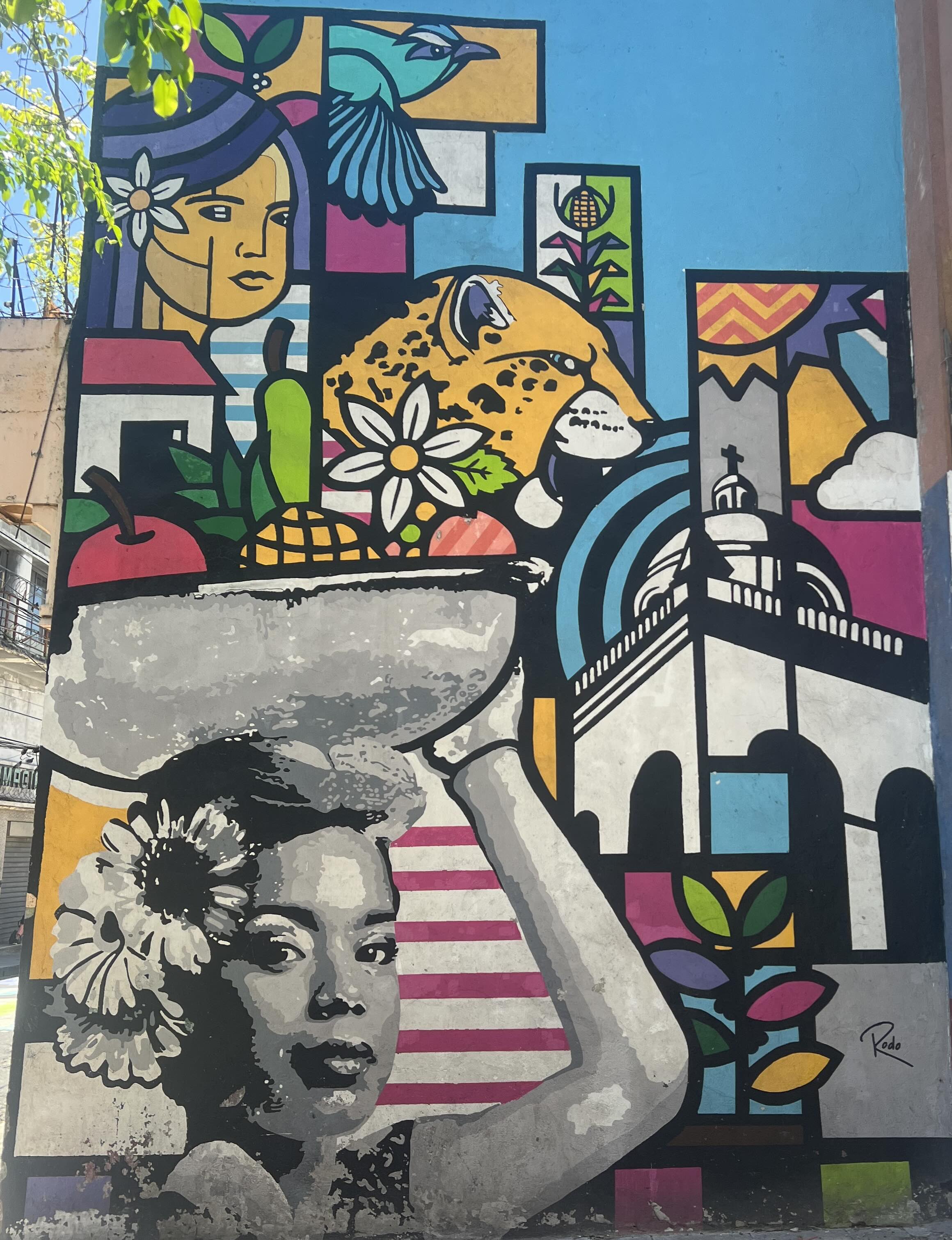
I’m fully aware that I lived in one of the most touristy, safe, and somewhat artificial places in El Salvador. I also know it’s not my country, and I don’t have a full grasp of its history or nuances. However, I did make an effort to spend time outside of El Tunco, talk to locals of various ages (ranging from late teenagers to older adults), and from different economic backgrounds (though I didn’t reach the extremes). Most importantly, I tried to listen with an open mind and heart. That’s why this section is solely based on my conversations with locals. I’ll share my personal opinions in the “My Take” section.
From my first conversations with locals, it was clear that Nayib Bukele’s approval is pretty high. You don’t see many countries where people refer to their president as “El Tio,” “El Presi,” and so on. It almost felt like they saw him as their buddy, someone they trusted a lot. One guy told me that he’d love for Bukele to stay president much longer but also understood that he has a family and children, so he can’t be president forever. What struck me was how emotional he became when talking about the president and how sad he got when we discussed the end of Bukele’s term.
Naturally, I was curious about the past and why people supported Bukele so strongly. When I asked the guy I was driving with about it, he replied, “Do you have children?” I said no, and he responded with something along the lines of, you won’t be able to fully understand, but try to imagine being on the street with your daughter, and a gang member comes up to you and says:
“Your daughter comes with me, or I’ll kill her in front of you.”
That felt heavy. I knew he had children and had lived through those times. Other than saying, “That’s fucking awful” I stayed silent, left alone with my thoughts for a few minutes. Once again, I found myself feeling deeply grateful for my wonderful life.
While many other stories I heard weren’t as extreme as this one, they still had a major impact on people’s lives and their sense of safety. I don’t want to add too many of my own thoughts here, but I can definitely see how living in those conditions could fundamentally change you.
During these conversations, I tried to remain neutral. However, I did want to hear the local perspective on some of the criticism Bukele faces, particularly regarding human rights. Somewhat unsurprisingly, a few people asked me where human rights were when people were being killed in the streets.
While the vast majority of people I spoke with strongly supported Bukele, some took a more cautious stance. One young girl stands out the most in my mind because of how thoughtfully she analyzed the situation. She agreed that things are much better now, and there was no debate around that. However, she explained that historically, having so much power in one person’s hands almost never ends well. She also mentioned situations where police officers (I don’t recall the exact term she used) wouldn’t leave a property until they were paid, but that this power imbalance had improved over time. She talked about local kids being jailed for drug-related associations but noted that these same kids were released after people in the community signed a letter requesting their release. At the same time, she was concerned for those who don’t have anyone to write and sign such letters. So, even this side of the story has more layers and isn’t just black or white. Despite her concerns about people having so much power, she admitted that she feels happier now.
Another person who surprised me was a local surf shop owner I spoke with on multiple occasions. He had a laid-back, typical chill surfer vibe, but when asked about the situation in his country, he immediately transformed into someone serious and deeply engaged. He quickly started explaining how investments from China and their fishing practices are affecting the country. He also talked about how poor the healthcare and education systems are. He contrasted his relatively good life as a surf shop owner in a tourist town with the struggles of people in remote areas who can barely find work or earn anything close to what he does. I was shocked at how deeply and passionately he spoke about these complex topics, reminding me once again that there’s always more than meets the eye.
Surf
Arriving in El Salvador, I knew this would be my last surf spot for quite some time. Most importantly, I knew it was my final opportunity to stand up after the reality slap I got in Santa Teresa. My morale was still so low from that experience that, for the first few weeks, I decided not to surf at all. Eventually, I didn’t want to repeat my Santa Teresa mistakes, so I chose not to leave surfing until the last moment before leaving. I also decided to change my strategy this time, taking a more relaxed approach by starting with a beginner surfboard. Below is a short description of my five-day surf battle at El Sunzal beach break.
1 day
- Complete beginner foam surfboard
- Realized my goofy preference for only lefts wouldn’t work here, and I’d have to practice my rights
- Instant realization that part of my struggle with surfing came from the fact that, learning in Tamarindo, I was never pushed to paddle out that far
- Surprised to see turtles swimming nearby
- Like in Santa Teresa, I had that warm, euphoric feeling of near-death
- By the end of the session, I legit thought I was going to throw up. It got so bad that I had to jump in the water just to cool off and feel refreshed in a vertical position
2 day
- Switched to a more advanced beginner board
- Cardio still felt lacking, with that familiar sense of dying in warm euphoria
- Didn’t eat anything beforehand, so less of a feeling like I was about to vomit
3 day
- Cardio still tough. The idea of catching a wave after paddling out felt like an impossible dream
- Turtles next to me became a casual sight
4 day
- Switched to a shorter fun board
- Zero vomit sensations
- Catching lots of green waves
- Was able to catch waves more often without needing long breaks
5 day
- Felt like a cardio champ. While in reality, I wasn’t doing anything spectacular, remembering how I was dying on Day 1 made it feel amazing. I could catch waves almost instantly after paddling for longer periods. I felt more agile, which let me catch more waves and build confidence
- After catching my last wave, I still had some distance to the shore. Knowing this was my last surf session for a long time, I decided to catch one more wave closer to shore. A perfect wave came, and I paddled and stood up, but I did it too late, which led to me and my board tumbling like in a washing machine. I’d been through this before, but what made this time different was that I was very close to shore. After the tumbling stopped, I moved my hand from covering my head to feel around, trying to see if there was anything in front of me. As I extended my hand, I touched a huge rock, which made me realize that one more cycle in the washing machine and the outcome could have been very different
Overall, I had a wonderful time here. Yes, the crowds are insane, and there’s no denying that. I remember some random guy popping up next to me and saying he’d never seen such an intense crowd. But by that point, it already seemed normal to me, so I just said, “Yeah, I guess.” Since the wave is a long, right-hand peel, I felt that even with big crowds, it’s still pretty manageable to catch a wave, as people tend to spread out.
One of the biggest factors that made this a great wave for me was the side channel, which lets people like me, who haven’t surfed in a while, reach the break without dying. The wave and the crowd are also pretty mellow, creating a laid-back atmosphere. Although I initially thought I’d hate it being a right-hand point break, in reality, it turned out to be a great opportunity (and a bit of a forced one) to practice my rights.
All in all, I felt like I was slowly standing up again after being gloriously defeated in Santa Teresa. I couldn’t have asked for a better ending to my first surf adventure.
My Take
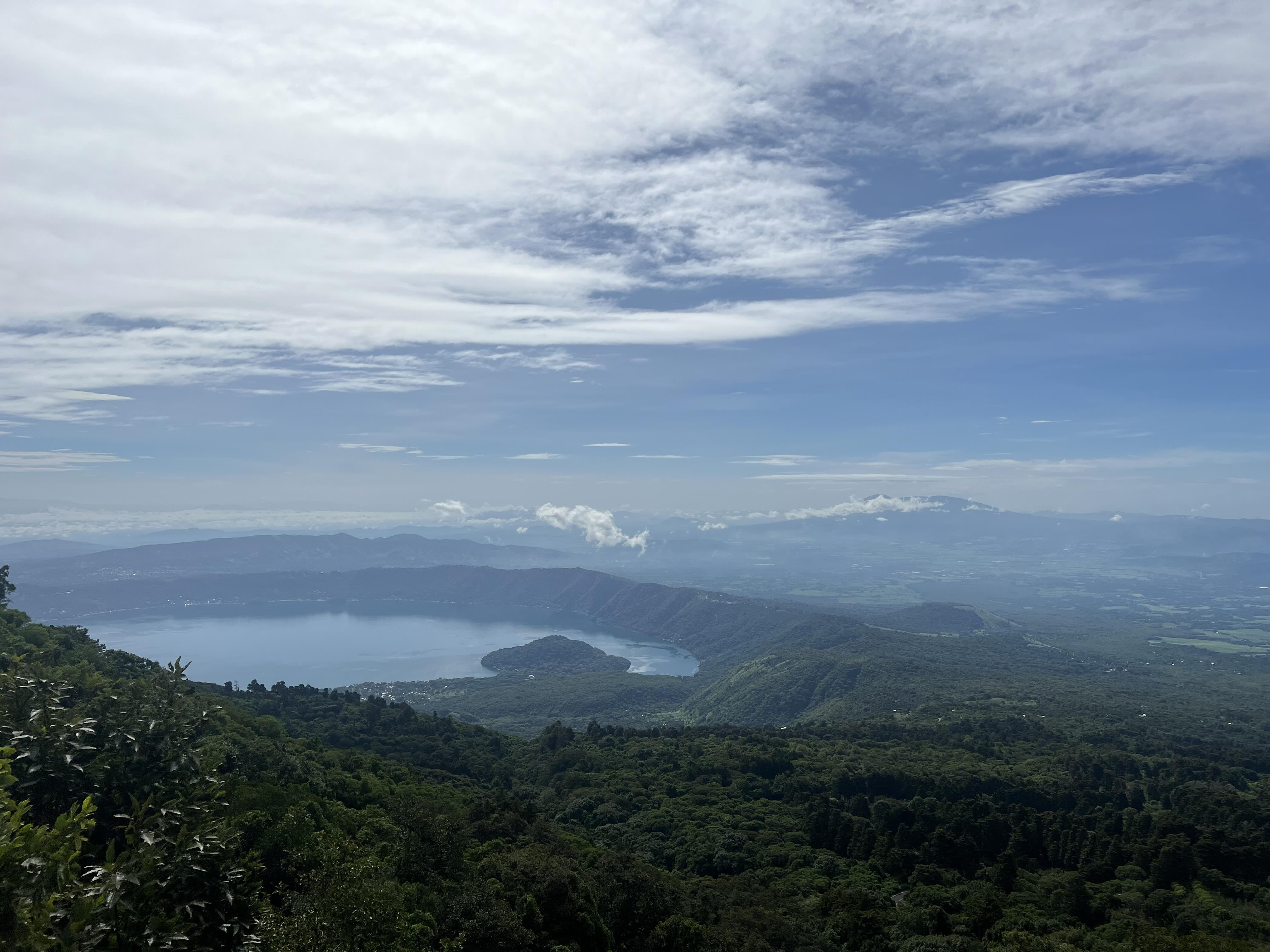
I don’t think I have the privilege or right to say how El Salvador should deal with their situation. What I can say is that from my first interaction to the last, I felt surrounded by incredibly friendly and kind people. I don’t know how true this is, but I have a theory that the tough times people have gone through contribute to that warmth. I can only imagine how someone who lived in fear for so long sees the world differently once they are free of that fear. I believe that after such a profound change, you start to appreciate and savor every moment much more. As a result, you radiate that appreciation to those around you.
For me personally, it’s impressive how much the country has managed to change in such a short time. Don’t get me wrong, there are still many problems and a long way to go, but it’s refreshing to see that such significant change is possible in certain aspects. For some reason, El Salvador made me think a lot about Ecuador. In some strange way, these two countries feel similar but also very different. To me, they seem like two brothers who met at a pivotal point and decided to walk in opposite directions. The sad part is that it seems in recent years, Ecuador, this amazing, beautiful country full of potential, has started heading down the same path of gang violence that El Salvador has left behind. I don’t have the political or historical knowledge to comment deeply on these issues, but I truly hope both of these beautiful countries will see a better tomorrow.
As for safety in El Salvador, I felt very safe. And I’m not just talking about the artificial, walled garden of El Tunco. Even walking in San Salvador, I felt pretty safe and intrigued by my surroundings. Walking past abandoned and not-so-nice buildings further away from the beautiful Centro Histórico, I still felt a sense of calm. While I wasn’t alone and it was daytime, I feel like El Salvador might still have a bit of an old bad rep that isn’t entirely deserved anymore.
Aside from the friendly people and great surf, El Salvador has so much more to offer: from volcanoes and mountains to beaches and national parks, it’s incredible how diverse this small country is.
As for El Tunco itself, it’s not really my kind of place. If you’re coming only to surf, it’s probably a great deal. You can live in a walled garden, have access to most things (though not supermarkets), party on weekends, and enjoy the waves. However, in a way, it feels a bit too artificial and lacking in depth. The main reason I chose it was for surfing and safety. But now that I have my own understanding of safety, I think I’d choose a different place, one that feels more authentic.
Overall, I was pleasantly surprised by El Salvador. Don’t get me wrong, there are still many problems and some sad scenes when you leave the touristy zones. But the friendliness and simplicity of the people made me feel very welcome. I really hope El Salvador can overcome its ongoing challenges and become a leading example for other Latin American countries facing issues of violence and insecurity.
Statement Rain
🟩
— Probably every single person I met asked if I had already tried pupusas. I did indeed try pupusas. While it wasn’t some groundbreaking, mind-blowing dish, it was cute how proud they are of it. It’s one of those meals I’d grab while walking in the scorching sun from the gym, drenched in sweat. My hack for eating them is to get three pupusas with different flavors that mix well for your taste (for me, something like Jalapeño con queso, Chicharrón, and Revuelta), and then stack them up like a cake and eat them with your hands. Locals told me that in their areas, they buy three pupusas for $1, but in touristy places, I don’t think you’ll find a better deal than $1 per pupusa.
— El Tunco had one of the chillest gyms I’ve come across in my travels, called VIBES Wellness House. Aside from being brand new, semi-open, and conveniently located for people staying in El Tunco, it was also one of the quietest gyms I’ve visited. Most of the time, I worked out alone or with just 1-3 people. During rest breaks, I enjoyed the view of the sun and the tops of palm trees peeking against the blue sky. The staff was friendly, the music was weird, and I enjoyed every session there.
— If you want a word for those awesome, cool, and amazing moments in El Salvador, remember “chivo.” If something was extra “chivo,” then “chivísimo” is your go-to word.
— While El Salvador is a relatively small country, it’s incredibly diverse in what it offers. El Salvador isn’t just about surfing.
— I had already developed an appreciation for buses covered in stickers back in Ecuador, so the colorful, dream-like buses weren’t new to me. What did make me smile, though, were buses with fake fins transformed to look like sharks. I also heard that buses in Guatemala are even more colorful, so I guess my bus art discovery journey isn’t over yet.
— I have a thing for lightning and storms (as long as I’m in a relatively safe place to observe them). I can say that in El Salvador, I experienced the closest and loudest lightning strike of my life. It was so loud that I was confused for about 10 seconds afterward.
— I was pleasantly surprised by the wildlife I encountered in El Tunco. Even though it’s pretty cut off from nature and filled with buildings, I still managed to see one of the most beautiful toucans of my life and laugh at funny little offenders like ninja squirrels and falling green iguanas.
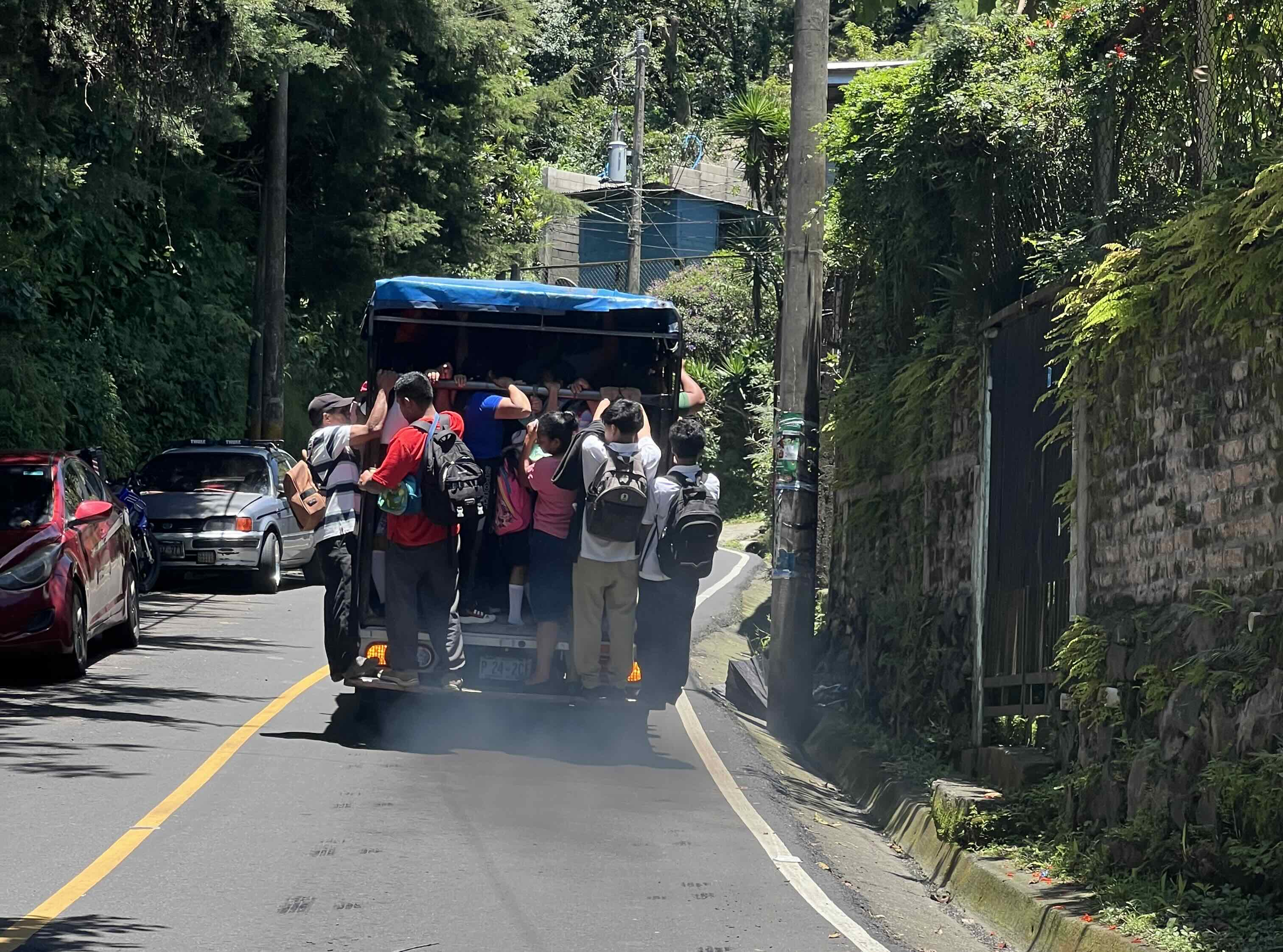
🟥
— During the winter season, the water can get really dirty from all the storms filling the rivers and pushing debris into the ocean. While it didn’t affect me, this can impact your surfing, as polluted water brings its own set of risks.
— While tourist areas look nice, like in any other country, you can see some heartbreaking sights when you venture further. The image of a dog with its bones exposed and a girl asking for money will probably stay with me for a long time.
— It might have been just the place I stayed at, but the water from the sink would get so bad (especially after rainy storms) that when I washed dishes, I joked with my family that I was boosting my immunity.
— I don’t know if this is just an El Salvador thing (I hadn’t experienced it in my travels before), but after passing through airport security, the airline performed an additional security check. The reason I mention this is that I travel with just one backpack. Imagine how much stuff I have in there and how perfectly packed it is. Now imagine someone unpacking all of it at extra security stage. Yes, people, not scanners, were inspecting the bags. You know where this is going, right? After 20 seconds of watching someone struggle to close a compartment that was no longer packed perfectly, I accepted defeat and told them to leave it as it was, knowing I’d have to repack everything anyway.
🟨
— Almost none of the locals I talked to use Bitcoin, but in some places, it’s an option for payment or withdrawal. What I found hilarious were things like “Satoshi Specialty Blend” coffee and random meme ads like “A Place for Plebs” Bitcoin hotel.
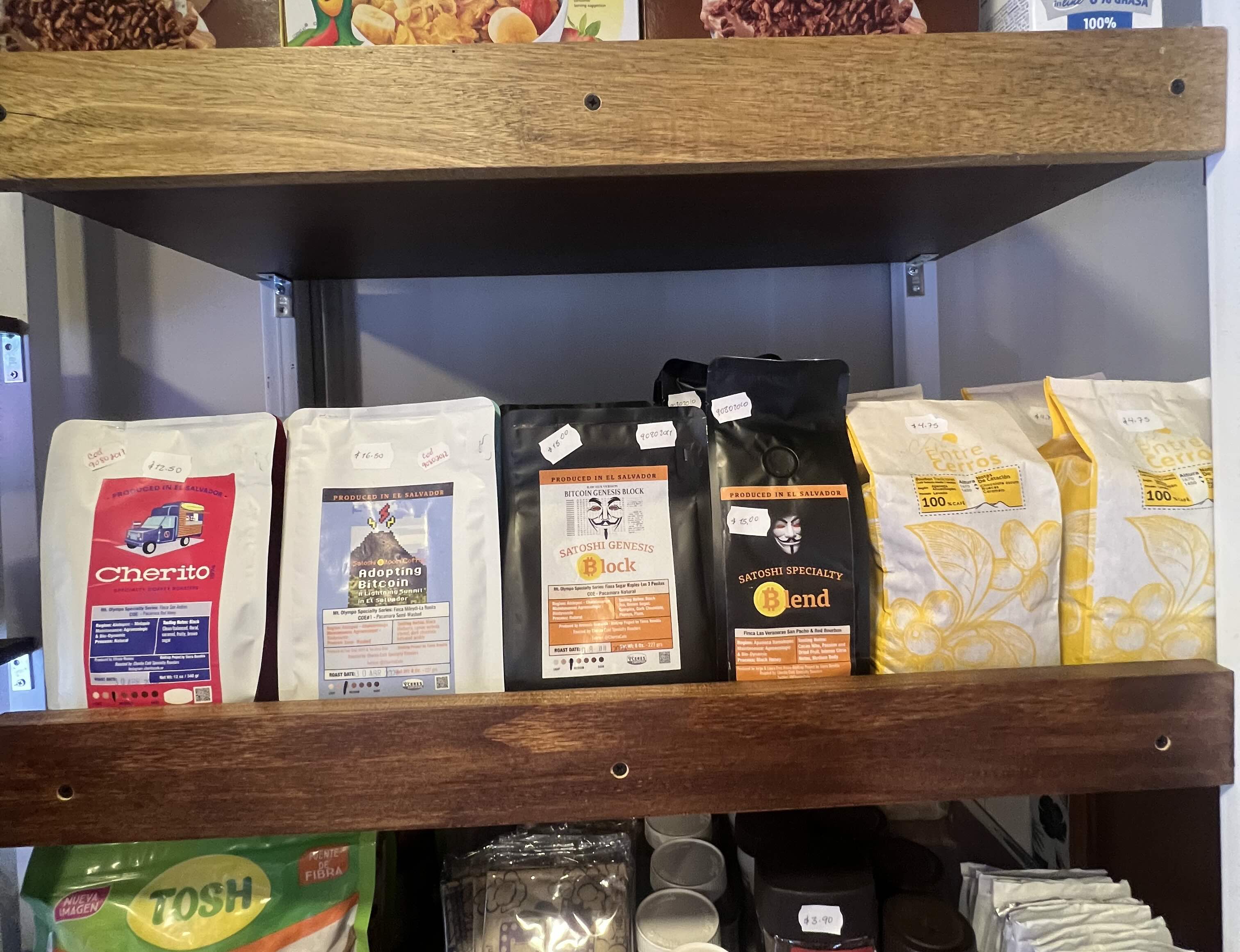
— It makes sense geographically, but it was interesting to experience how much less rain I encountered in El Salvador compared to Costa Rica, where I had just stayed.
— If you’re going to San Salvador, read up on Saint Óscar Romero and the places related to him. Even though I’m not a religious person, it was interesting to wander around. Also, if you’re into unique and unconventional architecture, Iglesia El Rosario is worth a visit.
— I’m not sure how strongly The Little Prince is connected to El Salvador (aside from the author being married to a Salvadoran woman who may have inspired the Rose), but it was funny when someone asked if I’d read “El Principito.” I was confused for a second before saying I didn’t think I’d heard of it. When they said it was a very popular book, I suddenly felt like the most illiterate person on the planet. We were in the Biblioteca Nacional de El Salvador, so I picked up the book, and the moment I saw the funny-looking planet, I realized it was The Little Prince.
— I don’t usually think about these things, but it was interesting to learn about El Salvador’s high dependence on imports and how it affects food security. At first, I was surprised since I assumed they’d have good conditions for growing various crops. But when you consider the country’s economic dependence on exports like coffee and sugar, it starts to make more sense. One real-life example locals shared was how border blockades with Guatemala affected people. It was eye-opening since back home, I wouldn’t usually think about how reliant we are on certain things.
— Reading this, it might seem like all my Spanish adventures go smoothly. Well, in El Salvador, I had a funny lesson about paying closer attention to words. I wanted to try something traditional and was told that “Sopa de Patas” is a traditional soup worth trying. For some reason, I mentally swapped “patas” with “papas” and thought, “Oh sure, potato soup sounds fine.” I also ordered fish, and the person I was with asked if I was sure I could eat all that. I said I was really hungry, so it shouldn’t be a problem. I mean, why would potato soup be that filling? Well, I realized my mistake when they brought me a bowl of soup with a bunch of cow feet. While I enjoyed the broth and the parts that weren’t feet, I have a feeling I won’t be confusing “patas” with “papas” anytime soon.
— Similarly to the Darkness story in Costa Rica, in El Salvador, I experienced something I could call Heat story. It was probably around 6 pm when the electricity disappeared in El Tunco. Nothing special, I thought. I’ve been through this rodeo quite a few times. Since I was tired and it was getting warmer, I figured I’d better sleep now and ride out most of the outage. I woke up around 11 pm, feeling sweat rushing through my body. The electricity was still out. The air felt hot and humid. It made sense since the place I stayed had holes and gaps where outside air could come in. I tried to sleep but couldn’t.
I started thinking: What if there’s no electricity until tomorrow? Or the day after tomorrow? Well, I’m not in the jungle, there’s infrastructure, so it can’t last that long. But what do I do now? I remembered home and thought about cold floor tiles, how I could just lie on them to cool down. My room didn’t have that. Everywhere in my room was equally hot. I was sweating even more, but it seemed there was nothing I could do. That sense of helplessness started a mini panic attack. At this point, I couldn’t just lie in bed. I had to do something.
I went to the window, thinking about opening it. But then I stopped. What if the humidity and heat outside are even worse? I’d lose it mentally. I double-checked to see if the electricity outage had also taken out the water. Yes, no water in the shower or sink. I sat back on my bed, feeling even more hopeless. The sweating and uncontrollable urge to just get up and walk were getting worse. I tried calming myself by thinking, worst-case scenario, I could walk to the sea. It felt like the temperature and humidity were rising every second as I thought more about my inability to change the situation.
Just as I was sitting there like a Greek philosopher, holding my head in both hands, I heard a loud beep. The electricity was back. I turned on the A/C and started rethinking my love for warm, sunny weather. I’ve had much longer outages living on the mountaintop in Taganga, but now I realize that in those moments, the mountain wind saved me from meeting my arch-nemesis—helplessness.

